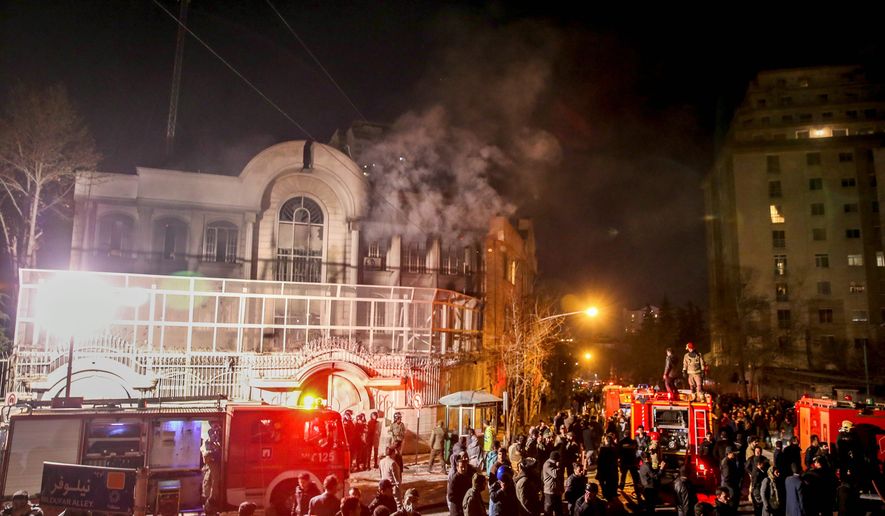TEHRAN — Saudi Arabia announced Sunday that it was severing diplomatic relations with Shiite powerhouse Iran amid escalating tensions over the Sunni kingdom’s execution of a prominent Shiite cleric.
The move came hours after demonstrators stormed and set fire to the Saudi Embassy in Tehran in protest over the death of Sheikh Nimr al-Nimr. Saudi Foreign Minister Adel al-Jubeir said Iranian diplomatic personnel had 48 hours to leave his country and all Saudi diplomatic personnel in Iran had been called home.
The mass execution of Sheikh al-Nimr and 46 others — the largest carried out by Saudi Arabia in 3 decades — has laid bare the divisions gripping the Middle East, where demonstrators took to the streets from Bahrain to Pakistan in protest.
It also illustrates the kingdom’s aggressiveness under King Salman. During his reign, Saudi Arabia has led a coalition fighting Shiite rebels in Yemen and staunchly opposed regional Shiite power Iran, even as Tehran struck a nuclear deal with world powers.
Iran’s top leader warned Saudi Arabia on Sunday of “divine revenge” over Sheikh al-Nimr’s death, while Riyadh accused Tehran of supporting terrorism in a war of words that threatened to escalate even as the U.S. and the European Union sought to calm the region.
Sheikh al-Nimr was a central figure in Arab Spring-inspired protests by Saudi Arabia’s Shiite minority until his arrest in 2012. He was convicted of terrorism charges but denied advocating violence.
SEE ALSO: Saudi allies scale back ties with Iran as tensions soar
On Saturday, Saudi Arabia executed Sheikh al-Nimr and three other Shiite dissidents, along with a number of al Qaeda militants. Sheikh al-Nimr’s execution drew protests from Shiites around the world who backed his call for reform and wider political freedom for their sect.
Although the split between Sunnis and Shiites dates back to the early days of Islam and disagreements over the successor to Prophet Muhammad, those divisions have grown as they intertwine with regional politics. Iran and Saudi Arabia are vying to be the top power in the Middle East.
Iran accuses Saudi Arabia of supporting terrorism in part because it backs Syrian rebel groups fighting to oust its embattled ally, President Bashar Assad. Riyadh points to Iran’s backing of the Lebanese Hezbollah and other Shiite militant groups in the region as a sign of its support for terrorism. Iran also has backed Shiite rebels in Yemen known as Houthis.
Iran’s supreme leader, Ayatollah Ali Khamenei, condemned Sheikh al-Nimr’s execution. He said Sunday that the cleric “neither invited people to take up arms nor hatched covert plots. The only thing he did was public criticism.”
Iran’s powerful Revolutionary Guard said Saudi Arabia’s “medieval act of savagery” would lead to the downfall of the country’s monarchy.
Saudi Arabia’s Foreign Ministry said that by condemning the execution, Iran “revealed its true face represented in support for terrorism.”
In Tehran, a protest outside the Saudi Embassy early Sunday quickly grew violent as protesters threw stones and gasoline bombs at the embassy, setting part of the building ablaze, according to Gen. Hossein Sajedinia, the country’s top police official, the semi-official Tasnim news agency reported.
Forty people were arrested, and investigators were pursuing others, Tehran prosecutor Abbas Jafari Dowlatabadi said, according to the semi-official ISNA news agency.
Iranian President Hassan Rouhani condemned Saudi Arabia’s execution of Sheikh al-Nimr but also branded those who attacked the Saudi Embassy as “extremists.”
“It is unjustifiable,” he said in a statement.
Hundreds of protesters later demonstrated in front of the embassy and in a central Tehran square, where street signs near the embassy were replaced with some bearing the slain sheikh’s name.
Across the region, protesters also took to the streets.




Please read our comment policy before commenting.